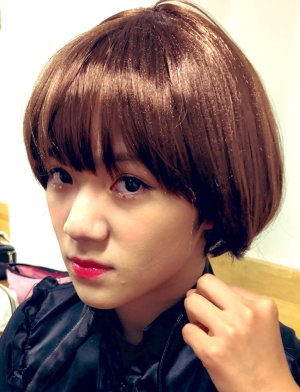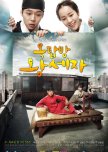It’s not easy to give Rooftop Prince a final score because the drama is like three different series altogether. The first one, probably the one I enjoyed most, is very silly but it genuinely made laugh with its extravagances for daily life things. The second drags out a lot, becomes slow and fairly boring by repeating the same scenarios over and over. And the third and last turns up the drama until it almost gets out of hand—although, fortunately, not to the very end.
The drama itself ends up a bit disorganised, so I’ll try to make my review tidy in exchange.
PROS (some):
- Park Yoo Chun.
I was saddened to read that this amiable actor had been expelled from the industry. I thought him quite stiff for his role in Sungkyunkwan Scandal, but stiffness was partly what that role was about, and here he shows a lot more of what he can do. He brings a sort of sincere warmth (grumpy as the character may be) to the screen, so I would’ve liked to see more of his work.
- Songs.
Rooftop Prince has a fun soundtrack that was characteristic enough for me to want to listen to it later. Quite goofy most of the time, and the dramatic parts were REALLY repetitive (they also added a sort of hilarious effect to the serious scenes), but then its two main songs are beautiful. Quite a highlight to remember the series by.
- All-in-one plot.
If you think about it, this plot probably has a bit of most things you’d think of. Romance, family melodrama, impersonation, murder, time travel, reincarnation… And then royalty, working people, rich businesspeople…
CONS (all):
- Again, all-in-one plot.
The series starts off really enjoyable from the moderately simple time travel comedy premise, but all the different genres it keeps on adding disfigure it until it’s hard to recognise . This could’ve not been necessarily bad, but its pace becomes constantly uneven, and some characters are affected too. For instance, for some reason the second Bak-Ha, who let her hair loose, seemed to act like a different person than pigtail Bak-Ha (I definitely preferred the feistiness of the initial Bak-Ha. The follow-up was kind of mild).
- The “evil” characters.
Probably because Rooftop Prince has little moderation and lets its dramatic events run loose, the “bad characters” (permanent enemies of the “good characters”) are so bad that it gets ridiculous. Every time you think they've done their worst, they go further. Se-Na spits out lies like a printer prints, and it’s exasperating how anyone still believes her. And Tae-Mu is just dead-set on revenge to the point of absurdity. There's nothing else to his character; certainly no credibility, and the the actor didn't help. The way the plot dragged on into unnecessary complications simply because these two did was often weary.
- It brings out the negative sides to dramas.
For the two points above, this drama tried my patience. A LOT. Eventually, it began to show a lot of the negative traits that I would’ve expected from bad Asian dramas, and which kept me from watching them altogether. Because I’ve seen mostly very good ones I had evaded them until now, but a good deal of this drama had that clinginess or cheap-looking feeling in the conflict scenes, and enough dumb confusions in the happier ones to muddle the plot further.
CONCLUSION (also TL;DR):
The drama drags a lot in the middle and it also grows a little tasteless when it switches comedy for drama. The misunderstandings, revenges, etc. pile up with far too much repetition and, what’s worse, come distressingly close to a soap opera.
But although most I’ve written sounds negative, that applies to a section of the drama only, and I eventually did not regret watching Rooftop Prince. Most of the parts focused on the four-coloured tracksuit Joseonites were great to watch, and the drama is so long you eventually feel pretty close to the main characters. Some are quite endearing.
Through some episodes it was so slow and repetitive that it exhausted my patience, but usually a better scene came up in-between to revive my interest. The underlying mystery that is present in the story from beginning to end was usually an aid in this, as the hints come up (very) gradually and build on slowly towards a very satisfactory ending, difficult as delivering one seemed.
Endings tend to be very personal so it might not work so positively for everyone, but this one redeemed a lot of the series for me. The last episode sorted out all the continued problems better than I thought it'd be able to, and on top of that it left me feeling good towards the series as a whole. It’s the endearing sensation that only series that have been worth watching can pull off.
The drama itself ends up a bit disorganised, so I’ll try to make my review tidy in exchange.
PROS (some):
- Park Yoo Chun.
I was saddened to read that this amiable actor had been expelled from the industry. I thought him quite stiff for his role in Sungkyunkwan Scandal, but stiffness was partly what that role was about, and here he shows a lot more of what he can do. He brings a sort of sincere warmth (grumpy as the character may be) to the screen, so I would’ve liked to see more of his work.
- Songs.
Rooftop Prince has a fun soundtrack that was characteristic enough for me to want to listen to it later. Quite goofy most of the time, and the dramatic parts were REALLY repetitive (they also added a sort of hilarious effect to the serious scenes), but then its two main songs are beautiful. Quite a highlight to remember the series by.
- All-in-one plot.
If you think about it, this plot probably has a bit of most things you’d think of. Romance, family melodrama, impersonation, murder, time travel, reincarnation… And then royalty, working people, rich businesspeople…
CONS (all):
- Again, all-in-one plot.
The series starts off really enjoyable from the moderately simple time travel comedy premise, but all the different genres it keeps on adding disfigure it until it’s hard to recognise . This could’ve not been necessarily bad, but its pace becomes constantly uneven, and some characters are affected too. For instance, for some reason the second Bak-Ha, who let her hair loose, seemed to act like a different person than pigtail Bak-Ha (I definitely preferred the feistiness of the initial Bak-Ha. The follow-up was kind of mild).
- The “evil” characters.
Probably because Rooftop Prince has little moderation and lets its dramatic events run loose, the “bad characters” (permanent enemies of the “good characters”) are so bad that it gets ridiculous. Every time you think they've done their worst, they go further. Se-Na spits out lies like a printer prints, and it’s exasperating how anyone still believes her. And Tae-Mu is just dead-set on revenge to the point of absurdity. There's nothing else to his character; certainly no credibility, and the the actor didn't help. The way the plot dragged on into unnecessary complications simply because these two did was often weary.
- It brings out the negative sides to dramas.
For the two points above, this drama tried my patience. A LOT. Eventually, it began to show a lot of the negative traits that I would’ve expected from bad Asian dramas, and which kept me from watching them altogether. Because I’ve seen mostly very good ones I had evaded them until now, but a good deal of this drama had that clinginess or cheap-looking feeling in the conflict scenes, and enough dumb confusions in the happier ones to muddle the plot further.
CONCLUSION (also TL;DR):
The drama drags a lot in the middle and it also grows a little tasteless when it switches comedy for drama. The misunderstandings, revenges, etc. pile up with far too much repetition and, what’s worse, come distressingly close to a soap opera.
But although most I’ve written sounds negative, that applies to a section of the drama only, and I eventually did not regret watching Rooftop Prince. Most of the parts focused on the four-coloured tracksuit Joseonites were great to watch, and the drama is so long you eventually feel pretty close to the main characters. Some are quite endearing.
Through some episodes it was so slow and repetitive that it exhausted my patience, but usually a better scene came up in-between to revive my interest. The underlying mystery that is present in the story from beginning to end was usually an aid in this, as the hints come up (very) gradually and build on slowly towards a very satisfactory ending, difficult as delivering one seemed.
Endings tend to be very personal so it might not work so positively for everyone, but this one redeemed a lot of the series for me. The last episode sorted out all the continued problems better than I thought it'd be able to, and on top of that it left me feeling good towards the series as a whole. It’s the endearing sensation that only series that have been worth watching can pull off.
Cet avis était-il utile?









